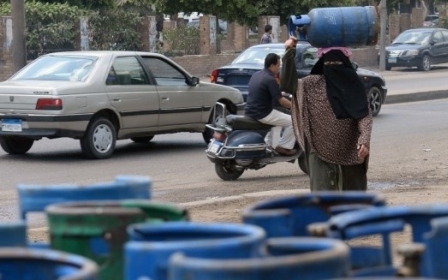Egypt 'missed payment' for diverted gas tanker: Reports

Confusion surrounding the diversion to Brazil of an Egypt-bound liquified natural gas (LNG) tanker earlier this month amid reports of missed payments could be a sign that Egypt's economic problems are affecting its energy supplies, traders have said.
The Wall Street Journal reported on Friday that two suppliers to EGAS, Egypt's state-owned gas company, had told it they were awaiting payments as Egyptian firms struggled to pay for imports because of a foreign currency crisis made worse by the collapse of the tourism industry.
“The payment difficulties are affecting all parties,” one trader at a European gas firm told the American newspaper.
Reports of missed payments come after BP's British Sapphire gas tanker spent several weeks circling off the country's Ain Sokhna import terminal before being diverted to Brazil on 7 January.
Khaled Abdel Badie, the chairman of EGAS, told the Reuters news agency on Friday that Egypt had postponed the delivery until Egypt's peak energy consumption period in August and dismissed reports of missed payments as “completely untrue”.
But industry sources said Egypt had last month asked for 90 days to pay for LNG deliveries, instead of the usual 15-20 days, leaving the country up to $500m in arrears, Reuters reported.
BP has not commented on the diversion of the British Sapphire, which left Qatar on 10 December and is now crossing the South Atlantic.
One analyst said Egypt's months-long payment problems could be worsened by a fall in cash flow from the Gulf Cooperation Council (GCC) caused by the sharp drop in oil prices.
“Egypt is basically financed by the GCC, so this was one of the things to watch for when oil prices dropped,” said Olivier Jakob of Switzerland-based Petromatrix. “If GCC cash flow is affected, this could have implications for Egypt.”
Some traders believe Egypt could do a deal with Saudi Arabia to help it meet payments for the next few months at least, while others predict the country may need to be bailed out by the International Monetary Fund or the World Bank.
Chris Jarvis, the IMF mission chief for Egypt, said: “We are not in talks on a new programme or a loan. So far, the authorities have not requested IMF financing, but we would be ready to consider such request when the authorities feel it is opportune. The Fund stands ready to help Egypt and its people.”
For some suppliers though, delayed payments may be reason enough to cancel contracts with Egypt.
“Contracts vary and some may or may not have the right to terminate because of delayed payments,” said one supplier.
Despite its economic and political difficulties, Egypt has benefited from recent oversupply in the LNG market with the country installing a second floating LNG terminal last year.
But Egypt's aspirations to tap its own LNG reserves, boosted last year by the announcement of the discovery of the "largest ever” natural gas field found off Egypt’s coast, have been hamstrung by its struggle to attract multinational firms willing to invest in exploration.
Sherif Ali Elhelwa, an energy industry analyst, last year told Middle East that LNG imports cost the country about a third of its spending budget every three to four months.
Elhelwa said it would likely be at least two years and probably before Egypt was able to tap into its newly discovered reserves, with many Egyptians likely to continue to experience rolling blackouts during periods of peak energy use.
Last year, the government reduced household blackouts by ordering many factories and businesses to cut their energy use by one hour a day.
Stay informed with MEE's newsletters
Sign up to get the latest alerts, insights and analysis, starting with Turkey Unpacked
Middle East Eye delivers independent and unrivalled coverage and analysis of the Middle East, North Africa and beyond. To learn more about republishing this content and the associated fees, please fill out this form. More about MEE can be found here.




